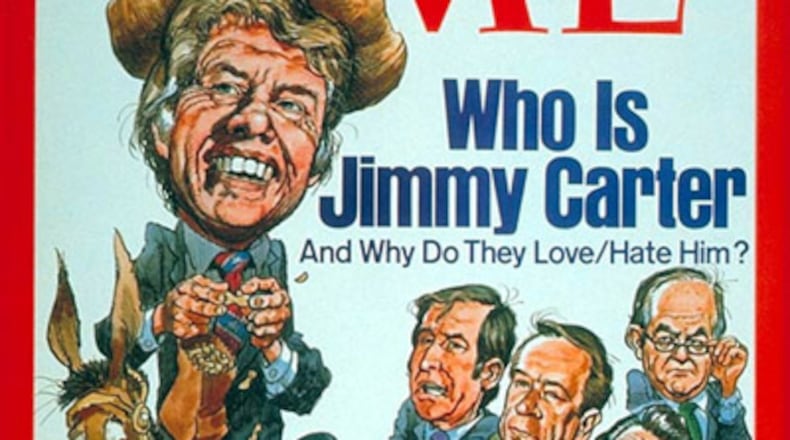I didn't live in Georgia back in 1976, and the odds are good that you didn't either. The state's population back then was five million, roughly half what it is today, and over the past 40 years many of that original five million have passed on. So most of us living in Georgia weren't here to witness the election of Jimmy Carter as president of the United States.
Nor do we have a sense of its impact on the state.
But over the past quarter-century, I've run across a lot of Georgians who do remember that era, and they remember it intently. Some had worked as volunteers on the Carter presidential campaign; some even went to Washington to work in his administration. A few of my older, now-retired colleagues in the press covered Carter's campaign and administration and loved to tell old war stories over a beer or two. And a lot of the people who have offered stories were just ... people, witnessing it all from the sidelines.
But as I've heard those stories spun, one thing they all shared was a sense of deep wonderment and pride. Forty years ago, they didn't really believe that Georgia -- a backward, Deep South state that a few years earlier had embarrassed itself by electing the segregationist Lester Maddox as governor, a state famous at the time as the setting for "Deliverance" and its in-bred hillbillies -- could somehow produce a president.
They didn't believe that one of their own -- a peanut farmer from South Georgia of all things -- could accomplish such a feat. As a headline in the Atlanta Constitution put it, "Jimmy Who Is Running For What!?" More importantly, Georgians didn't believe that the rest of the country would accept as president someone who talked like they did and prayed like they did, someone with a family back in Plains that would seem at home in the cast of "The Beverly Hillbillies." The curious sense of Southern inferiority that still pops up too often today and still causes this region to lower its sights had an almost crippling impact back then.
So before it could be anything else, Carter's bid for the presidency was a triumph of the imagination. And it was a triumph of the imagination not just for Carter himself and those closest to him, but for the entire state.
Politics has changed a lot in the past 40 years. In the era of the Internet, email and cable TV news, it's a lot easier for an obscure governor to break into the national consciousness. It's also a lot easier to build a political and financial network of like-minded supporters that crosses state and regional lines. Today, candidates such as Scott Walker on the right and Bernie Sanders on the left have donors and supporters drawn from all over the country.
Back in the mid-'70s though, unknown candidates such as Carter had to rely much more heavily on their own home-state networks for donations, political expertise and volunteers. A lot was made about Carter's "Peanut Brigade" of Georgia-based volunteers that invaded northern primary states, turning on the Southern charm on behalf of their candidate, but that was only the most visible aspect of a commitment by the state's entire power structure to elect Carter to the White House.
And to the amazement of those involved, it succeeded. Carter won the Iowa caucuses; he won in New Hampshire. He won the Democratic nomination over better-known opponents, and in November of 1976 he won the presidency, becoming the first person from the Deep South ever to win that office.
His presidency, of course, was not the success that he wished it to be, although I think a fair reading of history would conclude that whatever his failings, the man was flat-out snake-bit. Much of what happened during his four-year term was out of his control and would have been out of the control of anybody who held office at the time.
Such debates aside, though, I think it's important that we give Carter credit for changing Georgia's image of itself. Almost a century after newspaper editor Henry Grady started selling the concept of a "New South," Carter's election announced that the South had indeed risen again, with Atlanta as its capital. And that sense wasn't just smoke and mirrors, it was real.
With Carter's election, the state demonstrated that it had the talent, resources and grit to play on the national stage, and once that realization sunk in, confidence soared. Expectations lifted. Ambitions that had once seemed too lofty -- such as winning the Olympics -- suddenly looked attainable. Carter's high standing internationally, heightened by his work through the Carter Center, also gave Atlanta and Georgia a profile that has made it more attractive to immigrants and to foreign business, and that reputation continues to produce benefits to this day.
In short, the kid from Plains helped bring the world to Georgia, and modern Georgia to the world, and it began with those eight humble yet assertive words:
"I'm Jimmy Carter, and I'm running for president."
About the Author
Keep Reading
The Latest
Featured


